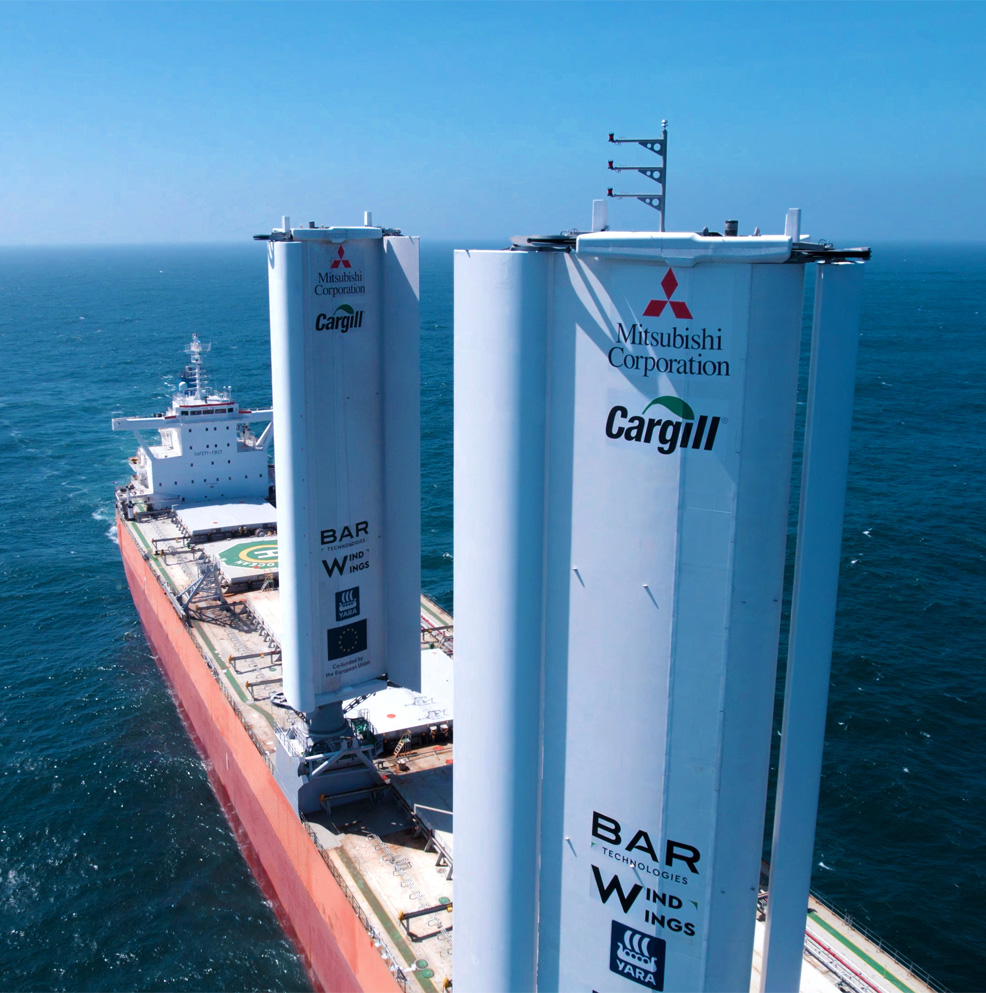
21st August 2023 Wind-powered cargo ship sets sail New, ground-breaking wind technology for the maritime industry has the potential to decarbonise large cargo vessels, which are currently responsible for about 2% of global emissions.
Pyxis Ocean, a bulk carrier measuring 229 m (751 ft) in length, with gross tonnage of over 43,000 MTs, has begun its maiden voyage from China to Brazil. This is no ordinary cargo vessel, however, as it comes fitted with new "WindWings" designed to reduce reliance on fossil fuels. The ship and its clean power source are a collaboration between Cargill, BAR Technologies, Mitsubishi Corporation and Yara Marine Technologies. Two large sails measuring 37.5 m (123 ft) in height are fitted to its deck to harness the power of wind. Ships have used wind power since antiquity, but only recently has the idea of modern cargo vessels exploiting its potential gained momentum, due to concerns over climate change, air pollution, and energy security. Tyre company Michelin presented a wind sail concept in July 2021 for cutting fuel consumption by 20%. Pyxis Ocean, chartered by Cargill, is the first vessel to be retrofitted with two WindWings. Produced by Yara Marine Technologies, they are expected to generate average fuel savings of up to 30% on new build vessels, which could be even higher if used in combination with alternative fuels. Installation of the wings occurred at the COSCO shipyard in China and the Pyxis Ocean is now on the water, conducting her maiden voyage.
"The maritime industry is on a journey to decarbonise – it's not an easy one, but it is an exciting one," said Jan Dieleman, President of Cargill Ocean Transportation. "At Cargill we have a responsibility to pioneer decarbonising solutions across all our supply chains to meet our customer's needs and the needs of the planet. A technology like WindWings doesn't come without risk, and as an industry leader – in partnership with visionary shipowner Mitsubishi Corporation – we are not afraid to invest, take those risks, and be transparent with our learnings to help our partners in maritime transition to a more sustainable future." The WindWings project is co-funded by the European Union, as part of the CHEK Horizon 2020 initiative. In addition to newer vessels, it could provide a retrofitting solution for decarbonising older ships, which is particularly relevant given that 55% of the world's bulker fleets are up to nine years in age. On an average global route, WindWings can save 1.5 tonnes of fuel per sail per day. This can translate into vessel operators saving heavy fuel oil (HFO) at c$800 per tonne, which will become even more important when saving against future fuels which will undoubtedly cost a lot more. The savings will be even higher on transoceanic routes.
The performance of the sails will be closely monitored over the coming months to further improve their design, operation, and performance, with the aim that the Pyxis Ocean will be used to inform a scale-up and adoption across not only Cargill's fleet but the industry. BAR Technologies and Yara Marine Technologies are already planning to build hundreds of wings over the next four years and BAR Technologies is also researching newbuilds with improved hydrodynamic hull forms. "If international shipping is to achieve its ambition of reducing CO2 emissions, then innovation must come to the fore. Wind is a near marginal cost-free fuel and the opportunity for reducing emissions, alongside significant efficiency gains in vessel operating costs, is substantial. Today is the culmination of years of pioneering research, where we've invested in our unique wind sail technology and sought out a skilled industrialisation partner in Yara Marine Technologies, in order to provide vessel owners and operators with an opportunity to realise these efficiencies," said John Cooper, Chief Executive Officer, BAR Technologies.
Comments »
If you enjoyed this article, please consider sharing it:
|









